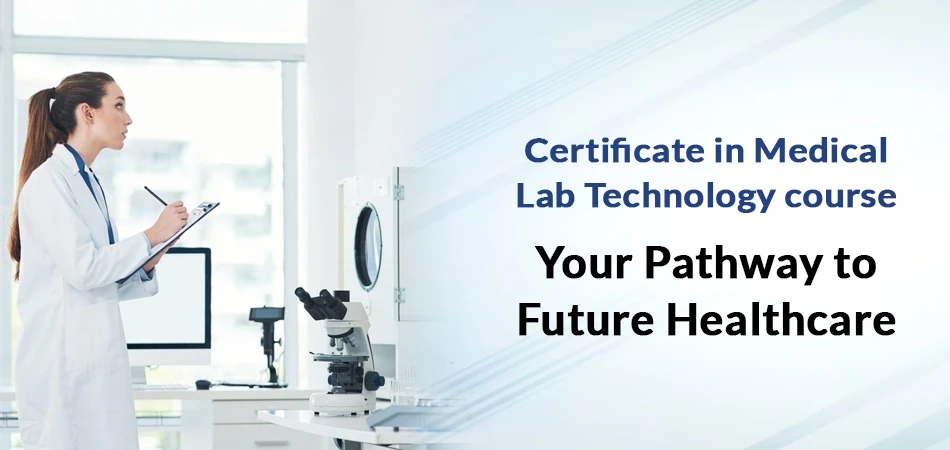Certificate in Medical Lab Technology course: Your Pathway to Future Healthcare

Certificate Courses in medical laboratory technology hold a bright future, offering numerous opportunities for advancement and growth. As a new graduate, here’s what you can expect in the evolving landscape of this sector:
1. Technological Advancements
Automation and Robotics: Medical laboratories are increasingly adopting automation and robotics to enhance efficiency and accuracy in testing. Graduates will work with sophisticated systems that streamline processes and reduce manual errors.
Advanced Diagnostic Tools: Cutting-edge diagnostic tools like molecular diagnostics, next-generation sequencing, and high-throughput screening will become increasingly common. Knowing how to use these tools will be essential to keeping up with advancements in the field.
2. Integration of Artificial Intelligence (AI)
AI in Diagnostics: AI and machine learning are being integrated into diagnostic processes to analyse complex data, predict outcomes, and improve diagnostic accuracy. Graduates will need to understand how to use and interpret AI-driven insights.
Data Management: AI will also influence data management and analysis, presenting chances for more effective management of big data sets and improved
3. Growth in Personalized Medicine
Tailored Treatments: The shift towards personalized medicine means that laboratory technologists will increasingly be involved in creating customized treatment plans based on genetic, environmental, and lifestyle factors.
Genomic Analysis: Understanding genomic and proteomic analysis will be vital as these techniques provide deeper insights into individual health profiles and disease mechanisms.
4. Telemedicine and Remote Services
Remote Diagnostics: The rise of telemedicine will extend to laboratory services, allowing for remote consultations and test result reviews. Graduates will need to adapt to new workflows that support remote interactions and virtual care.
Tele-laboratory Services: Opportunities might arise in tele-laboratory environments, where experts perform and assess tests from a distance, necessitating skills in digital communication and data protection.
5. Increased Focus on Quality and Compliance
Regulatory Standards: Continual updates to healthcare regulations and standards necessitate a deep knowledge of compliance and quality assurance practices. It will be crucial to adhere to these regulations to uphold high standards in laboratory operations.
Accreditation: Laboratories will strive to uphold and earn additional certifications, with technologists potentially assisting in preparing for and upkeep these accreditations.
6. Expanded Roles and Specializations
Specialized Fields: Graduates can pursue specialization in areas such as molecular diagnostics, cytogenetics, or clinical research. Advanced training and certifications will provide pathways for career advancement and specialization.
Leadership Opportunities: There will be growing opportunities for leadership roles in laboratory management, quality control, and program coordination, allowing technologists to influence and shape laboratory operations.
7. Interdisciplinary Collaboration
Healthcare Teams: Healthcare teams will need to work closely with other professionals like doctors, nurses, and researchers in order to enhance collaboration. It will be essential to understand how to effectively collaborate within interdisciplinary teams in order to deliver comprehensive patient care.
Research and Development: Collaboration opportunities in research will increase as lab technologists help develop new diagnostic tools and treatment methods.
8. Continuing Education and Professional Development
Lifelong Learning: The rapid pace of technological change will necessitate ongoing education and professional development. Graduates should engage in continuous learning to stay updated with the latest advancements and best practices.
Certifications: Earning more certifications and joining professional groups will improve job opportunities and offer access to current industry information and networking chances.
9. Global Health and International Opportunities
Global Initiatives: The growing focus on global health issues will offer opportunities to work on international projects, contribute to global research, and address public health challenges worldwide.
International Standards: Knowing global health standards and practices will be advantageous when working in various environments and partnering with international health organizations.
10. patient-centred Care
Enhanced Patient Interaction: As the focus on patient-centred care increases, laboratory technologists will be involved in improving patient experiences, communicating effectively about test results, and ensuring a high level of patient engagement and satisfaction.
Ethical Considerations: Understanding ethical considerations related to patient care, data privacy, and informed consent will be important as technology and practices evolve.
Overview
| Particulars | Details |
| Course Level | Certificate, Diploma, Bachelor’s, Master’s |
| Duration | 1 Year, 2 years, 3 years |
| Eligibility | 12th passed(From any recognised board) Bachelor’s in science for Master’s |
| Average course fees | 50,000 to 1 Lakh Rupees Annually |
| Average Annual Salary | 2-6 Lakh(Vary on Experience) |
| Job Opportunities | Laboratory Technician, Medical Officer, Research Associate, Medical Record Technician, Resident Medical Officer, Laboratory Testing Manager, Associate Manager, Technology Manager, Laboratory Manager,
|
Choose CMLT course from Ganesh Paramedical college
Joining a CMLT course can result in a rewarding job in the healthcare sector. This area presents an excellent opportunity for students seeking a profession with the possibility of substantial income. The expansion of the sector has resulted in an increased need for paramedical specialists. Admissions are currently available at the renowned Ganesh Paramedical College in Delhi for those seeking to train as healthcare professionals vital for diagnosing and treating patients in medical settings. Furthermore, we provide instructional sessions for BMLT and MMLT courses.
People may ask
Do paramedical courses require NEET?
No, NEET is not required for paramedical courses. However, a few colleges might have university entrance exams for students.
Is there any entrance exam for paramedical courses?
Admission to some of the paramedical courses is based on entrance exams. This includes JIPMER, NEET-UG, MHT CET, etc.
How many years is a Paramedical course?
Certificate courses go on for a duration of 1-2 years while degree courses are for 1-4 years.
Is paramedical a good career?
There are ample job opportunities for paramedical graduates and an increasing demand for trained people in these fields.

